Skyhooks were an Australian rock band formed in Melbourne in March 1973 by mainstays Greg Macainsh on bass guitar and backing vocals, and Imants "Freddie" Strauks on drums. They were soon joined by Bob "Bongo" Starkie on guitar and backing vocals, and Red Symons on guitar, vocals and keyboards; and Steve Hill lead vocalist, Graeme "Shirley" Strachan became lead vocalist in March 1974. Described as a glam rock band, because of flamboyant costumes and make-up, Skyhooks addressed issues including buying drugs in "Carlton ", sex and commitment in "Balwyn Calling", the gay scene in "Toorak Cowboy" and loss of girlfriends in "Somewhere in Sydney" by namechecking Australian locales. According to music historian, Ian McFarlane "[Skyhooks] made an enormous impact on Australian social life".

Something for Kate are an Australian alternative rock band, which formed in 1994 with Paul Dempsey on lead vocals and guitar, and Clint Hyndman on drums. They were joined in 1998 by Stephanie Ashworth on bass guitar and backing vocals. The group have released seven studio albums: both The Official Fiction (2003) and Desert Lights (2006) topped the ARIA Albums Chart; while Beautiful Sharks (1999), Echolalia (2001) and Leave Your Soul to Science (2012) reached the top 10. Two of their singles have reached the ARIA top 20: "Monsters" (2001) and "Déjà Vu" (2003). The band have received a total of 11 nominations for ARIA Music Awards in 1999, 2001 and 2003.

You Am I are an Australian power pop band, fronted by its lead singer-songwriter and guitarist, Tim Rogers. They formed in December 1989 and are the first Australian band to have released three successive albums that have each debuted at the number-one position on the ARIA Albums Chart: Hi Fi Way, Hourly, Daily and #4 Record. Nine of their tracks appeared on the related ARIA Singles Chart top 50 with "What I Don't Know 'bout You", their highest charting, at No. 28. You Am I have received ten ARIA Music Awards from thirty-one nominations. The band have supported international artists such as the Who, the Rolling Stones, Sonic Youth and Oasis.

The Whitlams are an Australian Indie rock band formed in late 1992. The original line-up was Tim Freedman on keyboards and lead vocals, Andy Lewis on double bass and Stevie Plunder on guitar and lead vocals. Other than mainstay Freedman, the line-up has changed numerous times. From 2001 to 2022, he was joined by Warwick Hornby on bass guitar, Jak Housden on guitar and Terepai Richmond on drums – forming the band's longest-lasting and best-known line-up. Four of their studio albums have reached the ARIA Albums Chart top 20: Eternal Nightcap, Love This City, Torch the Moon and Little Cloud. Their highest charting singles are "Blow Up the Pokies" and "Fall for You" – both reached number 21. The group's single, "No Aphrodisiac" was listed at number one on the Triple J Hottest 100, 1997 by listeners of national radio station, Triple J. In January 1996 Stevie Plunder was found dead at the base of Wentworth Falls. Andy Lewis died in February 2000.

"Prisoner of Society" is a song by Australian punk rock band the Living End. It was originally released in Australia on the 1997 EP Second Solution / Prisoner of Society. The song was later released as a single, separate from the EP, in the United States in January 1999. In January 2018, as part of Triple M's "Ozzest 100", "Prisoner of Society" was ranked number 32.
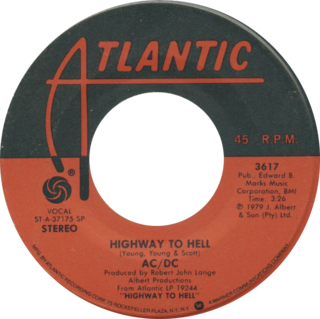
"Highway to Hell" is a song by Australian rock band AC/DC. It is the opening track of their 1979 album Highway to Hell. It was initially released as a single in 1979.

Faker are an Australian alternative rock band, formed in 1996 by mainstay Nathan Hudson on lead vocals, piano and guitar. They have released three studio albums, Addicted Romantic, Be the Twilight and Get Loved. Their highest charting single, "This Heart Attack" (2007), peaked at No. 9 on the ARIA Singles Chart. The group disbanded in December 2013, but they announced their reformation in October 2020.

"Friday on My Mind" is a 1966 song by Australian rock group the Easybeats. Written by band members George Young and Harry Vanda, the track became a worldwide hit, reaching No.16 on the Billboard Hot 100 chart in May 1967 in the US, No.1 on the Dutch Top 40 chart, No.1 in Australia and No.6 in the UK, as well as charting in several other countries. In 2001, it was voted "Best Australian Song" of all time by the Australasian Performing Right Association (APRA) as determined by a panel of 100 music industry personalities. In 2007, "Friday on My Mind" was added to the National Film and Sound Archive's Sounds of Australia registry.
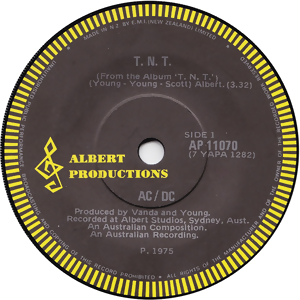
"T.N.T." is a song released in 1975 by Australian hard rock band AC/DC, taken from their Australian album T.N.T. and the international version of High Voltage. It was released as a single in 1976 and was written by Bon Scott, Angus Young and Malcolm Young. It peaked at No.19 on the Australian Kent Music Report Singles Chart. The song's title is a reference to the explosive chemical TNT.

"High Voltage" is a song by Australian hard rock band AC/DC. It was first released in Australia as a single in July 1975, though it is the eighth track of their second Australian album T.N.T., the release itself was issued as a stand alone single. The song was written by Angus Young, Malcolm Young and Bon Scott, and peaked at #48 on the UK Singles Chart in 1980.

"My Happiness" is a song by Australian rock band Powderfinger. It was released via record label Universal Music Australia on 21 August 2000 as the first single from the band's fourth album, Odyssey Number Five. Powderfinger frontman Bernard Fanning wrote the lyrics for "My Happiness" as a reflection on the time the band spent touring to promote their work, and the loneliness that came as a result. It was inspired by his love of gospel and soul music. The rest of the band are co-credited with Fanning for composing the track. Despite its melancholy mood, "My Happiness" is considered by many to be a love song, a suggestion Fanning regards as mystifying.

Ego Is Not a Dirty Word is the second studio album released by Australian rock band, Skyhooks, in July 1975. The album was the follow-up to their highly successful debut album, Living in the 70's (1974). As with the former album, it was also produced by Ross Wilson.
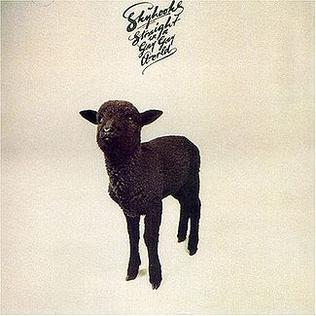
Straight in a Gay Gay World was the third studio album by Australian rock band, Skyhooks. The album was released in August 1976. With the exception of "Million Dollar Riff", it was recorded at The Record Plant in Sausalito, California, after the band's first tour of the United States earlier in the same year. The title and songs are a sort of view the band had on their experience in the States. The album was produced by former Daddy Cool leader Ross Wilson. It peaked at No. 1 on the Australian charts.

"Wide Open Road" is a single released in 1986 by Australian rock band The Triffids from their album Born Sandy Devotional. It was produced by Gil Norton and written by David McComb on vocals, keyboards and guitar. The B-side "Time of Weakness" was recorded live at the Graphic Arts Club, Sydney, November 1985 by Mitch Jones, mixed by Rob Muir. "Dear Miss Lonely Hearts" was recorded at Planet Sound Studios, Perth and produced by the Triffids. "Wide Open Road" reached No. 26 on the UK Singles Chart in 1986, and No. 64 on the Australian Kent Music Report Singles Chart. In May 2001 the Australasian Performing Right Association (APRA), as part of its 75th Anniversary celebrations, named "Wide Open Road" as one of the Top 30 Australian songs of all time.
"I'm Mandy Fly Me" is a single by 10cc released in 1976. It was taken from the How Dare You! album, and reached No. 6 on the UK Singles Chart.
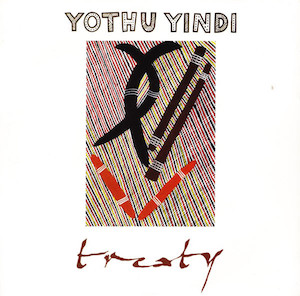
"Treaty" is a protest song by Australian musical group Yothu Yindi, which is made up of Aboriginal and balanda (non-Aboriginal) members. Released in June 1991, "Treaty" was the first song by a predominantly Aboriginal band to chart in Australia and was the first song partly in any Aboriginal Australian language to gain extensive international recognition, peaking at No. 6 on the Billboard Hot Dance Club Play singles charts. The song contains lyrics in Gumatj, one of the Yolngu Matha dialects and a language of the Yolngu people of Arnhem Land in northern Australia.
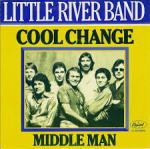
"Cool Change" is a song by Australian rock group Little River Band written by lead singer Glenn Shorrock. It was released in August 1979 the second single from their sixth album, First Under the Wire. The song peaked at number 10 on the Billboard Hot 100 the week of 19 January 1980.
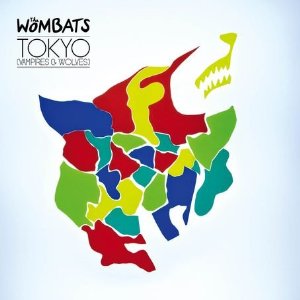
"Tokyo " is a song by Liverpudlian indie band the Wombats. It was the first single to be released from their second album This Modern Glitch. The song was added to the A-list on BBC Radio 1.
"No Secrets" is a song by Australian hard rock group, the Angels, released in April 1980 from their fourth studio album, Dark Room. "No Secrets" peaked at number 8 on the Kent Music Report Singles Chart. It was co-written by band members, Graham "Buzz" Bidstrup and Bernard "Doc" Neeson. In January 2018, as part of Triple M's "Ozzest 100", the most Australian songs of all time, "No Secrets" was ranked number 50.
"All My Friends Are Getting Married" is a song by Australian band Skyhooks, released in June 1975 as the second and final single from the band's second studio album, Ego Is Not a Dirty Word. It is written by the group's bass guitarist, Greg Macainsh and was produced by Ross Wilson. The song peaked at number two in Australia.
















